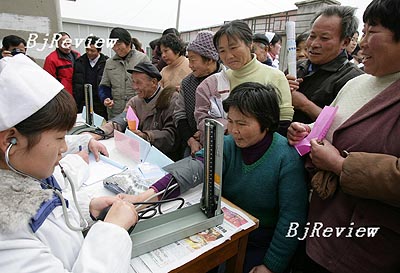|

Change is a word synonymous with China. Since inaugurating its reform campaign 29 years ago, the nation has seen countless examples of change, from the social, economic, political and cultural perspectives. Many of these changes have been dramatic and have spawned social problems and related disputes. The 21st Century Business Herald, a leading Chinese financial newspaper, recently convened a group of eminent scholars specializing in social sciences to discuss the challenges facing China's further reform and the trend of its social development. Professor Zhou Weimin, Editor in Chief of Study Times, Yang Fengchun, Dean of the E-Government Research Center of Peking University, Professor Mao Shoulong, Faculty Director of the Department of Public Administration of the Renmin University of China, and Professor Zhen Xiaoying at the Central Institute of Socialism, give their opinions in the following excerpts:
Soaring property prices, along with costly education and medical care, are among the top concerns in Chinese society today. What are the causes of these problems?
Zhou: A market economy should not bear the blame for rising expenses on education and medical care, yet fair market competition has not been realized in the field of public welfare, and most public service resources are monopolized by the government, despite the existence of a handful of privately funded hospitals and colleges.
During the planned economy, when almost everything was controlled by the central power, the life of ordinary citizens was tough in spite of a large proportion of state expenditures on the improvement of their living conditions, and great efforts in balancing production and distribution to keep a balance. From the very start until today, China's reform drive is aimed at addressing the issues surrounding people's livelihood. Since the reform and opening-up policy was adopted, people's lives have changed dramatically. Now, major public complaints focus on the sectors that are still monopolized by the government. Unaffordable housing properties are also in part caused by stringent state control of land resources and insufficient supply of affordable houses.
The problem is the government tries to cut financial input in monopolized sectors to force them to operate in line with market rules, yet the market is not fully open. Thereby the government must first relax its control over financing by allowing more private funds in these sectors, and accelerate its pace to shape a market environment where public funds and private components can be more efficiently allocated in fair competition. If administrative power continues to intervene, the scarcity fallout is very likely to worsen.
China's growing income gap is a result of increasingly uneven distribution of social wealth, rather than its transformation into a market economy. It is not the market economy and its operating mechanism that are to blame. This system should be further improved, particularly to advance the reform of the factor market, where the root causes for unfair distribution of income lie. (A factor market is a market in which factors of production are bought and sold, for example, the capital market or the labor market.)
Mao: A more relaxed real estate market allows more average people to improve their living conditions thanks to increased supply. But land resources are limited, more evident in densely populated urban areas where economic prosperity prompts housing prices to soar. Against this background, hikes of housing prices are inevitable.
A number of real estate properties possessed by individuals are left empty due to the lack of market mechanisms to boost resales and regulate lease of these houses. Though housing trades are common and free enough, the supply of land and other natural resources, which are subject to state control, still cannot satisfy demands, therefore, a more market-oriented system is needed to better allocate the resources for supply.
Likewise, reform of China's medical care system enables more patients access to medical resources. Despite this, over-centralized resources in urban areas in particular cannot help ailing farmers in rural areas. From an overall perspective, social justice is the major focus of today's government's work, rather than efficiency that should be automatically adjusted by the market.
What response should be made to the growing appeal for social justice among the broader population?
Yang: China's increasingly obvious division of the rich and the poor deserves more attention. On the one hand, people who are comparatively disadvantageous in social wealth distribution should be endowed with
| 